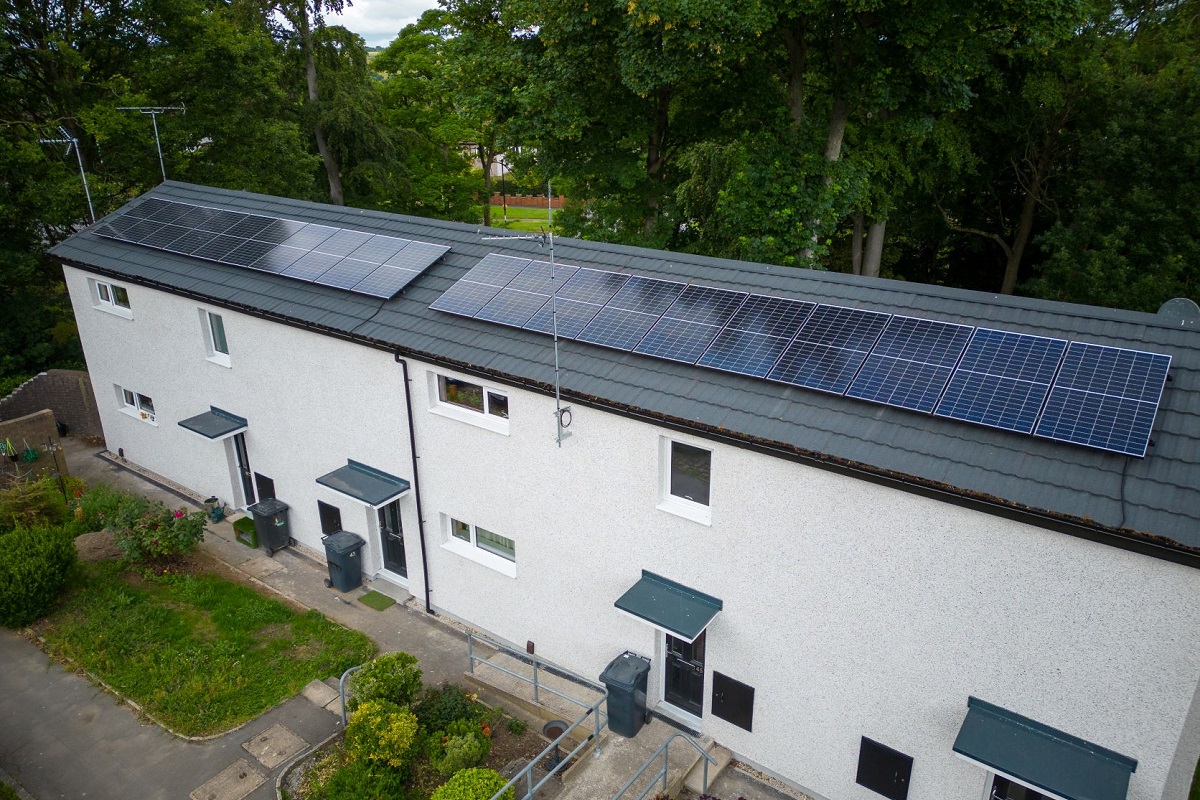You are viewing 1 of your 1 free articles
What will the most successful bidders for decarbonisation funding do with the money?
The full list of successful bidders to Wave 2.1 of the Social Housing Decarbonisation Fund is out. Grainne Cuffe looks at what they are planning
On Wednesday, the Department for Energy Security and Net Zero (DESNZ) released details of which landlord was awarded what in Wave 2.1 of the £3.8bn Social Housing Decarbonisation Fund (SHDF).
A total of £778m was awarded to 108 bidders, including councils, housing associations and consortiums to improve the energy efficiency of 90,000 homes.
One consortium – led by Clarion, the UK’s largest housing association – took the largest share of the funding with a £49m bid.
Nottingham City Council, which made the bid on behalf of a ‘net zero hub’ of 24 social landlord members, came in a close second with £47.2m.
Other large allocations included the Greater Manchester Combined Authority, which received £37m; Tees Valley Combined Authority, which received £32.4m; the Liverpool City Region Combined Authority, which received £31m; and Sanctuary, which received £40.4m.
Regionally, the South East bagged the most funding, with £128.9m awarded.
It follows on from the first wave of the SHDF, which was allocated in February last year, with 69 projects awarded a share of £179m.
The first wave went towards upgrading the energy efficiency of roughly 20,000 social housing properties that had an Energy Performance Certificate (EPC) rating below C by March 2023.
However, the deadline for the first wave was extended in February, after data revealed that just over 7% of the expected energy performance improvements had been completed.
Below, Inside Housing looks at successful bidders for the latest wave and their decarbonisation plans, along with some concerns raised by the sector.
Much of the retrofit measures cited by the bidders – whose comments are included at the end of this article – are similar.
They include cavity wall, loft and external wall insulation, improving ventilation, installing air-source heat pumps, as well as solar panels, new double glazing, and front and rear door replacements.
Many social landlords cited the same goals: improving the efficiency of homes, achieving net zero, and reducing energy bills for residents who are struggling amid the cost of living crisis.
Clarion
Clarion will upgrade more than 6,000 homes as part of a consortium bid, it said.
The 125,000-home landlord, which owns 5,300 of the homes, submitted the bid on behalf of Accent Housing, Worthing Homes, Southdown and BHT Sussex.
The total project cost exceeds £100m, including £60m from Clarion’s subsidy.
Rob Lane, chief property officer at Clarion, said the programme of work is “truly national” and will improve stock in all of the major local authorities it has homes in.
He said the funding has a “triple benefit”.
He explained: “Targeting the hardest to treat homes – the least energy efficient – has an instant impact on [housing] conditions.
“You are improving the insulation, the energy retention and the heat retention within those homes so they will stay warmer and provide a better environment for the residents straightaway, which is really important for us.
“It will also have an impact on fuel bills.”
Mr Lane added that energy consumption is expected to be reduced by 60%.
“That equates to saving residents over £500 a year on average on their fuel bills,” he stated. “And then the third benefit is carbon savings.”
Asked whether Clarion is concerned about getting the work done, given skills shortages in the industry, Mr Lane said no.
He added: “It is going to take, you know, more training, more growth, but certainly this amount of funding nationally should be a bit of a turbo boost to encourage suppliers to switch and and move into this business.
“We put this bid in before Christmas. The supply chain has had a long time to really work on this and warm up to what they need in terms of generating the labour and the skills that they need to start these programmes.”
Clarion was also a demonstrator in Wave 1 of the SHDF. Initially retrofitting one home took 100 days, now that is down to 35.
“No, I’m not concerned. There’s a lot to do, but I think the supply chains can adapt and grow. It’s exciting – the amount of green jobs and economic benefits that this is going to have,” Mr Lane said.
Nottingham City Council
Nottingham City Council made the successful £47m bid on behalf of the Midlands Net Zero Hub, which is hosted by the council and funded by the DESNZ as part of its clean growth strategy.
The hub, which aims to facilitate investments in energy projects, is one of five across England and has 24 members, including 14 housing associations and 10 councils.
The funding will go towards improving the energy efficiency of up to 4,226 social homes in the region.
Nottingham Council itself secured £2.9m to retrofit 371 social homes.
Nearly £600,000 of the funding is set to be used for developing digital technologies to support smart building use, for example sensors to monitor the effectiveness of the measures installed.
The information collected will be used to make improvements to retrofit work in the future as well as identify issues, such as damp and mould, within properties and flag fuel poverty, the council said.
Sanctuary
The £40.4m bid from Sanctuary represents the Greener Futures Partnership consortium, which also includes Abri, Anchor, Home Group and Hyde.
The partners will use the cash to retrofit 5,000 social homes.
Monitoring equipment will also be fitted to a number of different property types, to help measure how successful the retrofit works have been in terms of reducing carbon and increasing thermal performance.
Tees Valley Combined Authority
The North East & Yorkshire Net Zero Hub, led by host Tees Valley Combined Authority, made the bid on behalf of a consortium made up of Arches Housing, Assist Sheffield, Barnsley Council, Believe Housing, Bernicia, Beyond Housing, Broadacres, Darlington Borough Council, Doncaster Council, Great Places Housing Group, Hartlepool Borough Council, Humankind Housing, Karbon Homes, Livin, North Star Housing, Railway Housing Association, Sheffield Council, South Tyneside Homes , and Thirteen Group.
The partners, which will provide £48.2m in match funding, will deliver an £80m retrofit project for 5,525 homes.
Greater Manchester Combined Authority
The Greater Manchester Combined Authority (GMCA) is made up of the 10 Greater Manchester councils including Bolton, Bury, Manchester, Oldham, Rochdale, Salford, Stockport, Tameside, Trafford and Wigan.
It made the £37m bid on behalf of a consortium of 18 social landlords.
The funding will go towards £97m worth of decarbonisation improvements in 5,482 homes in the region, following £60m in match funding from partners.
Works are expected to start in April and be completed by September 2025.
Southway Housing Trust secured £1.96m of the funding awarded to GMCA’s consortium bid.
It said funding will go towards retrofitting Southway’s least energy-efficient homes. Around 1,112 properties across South Manchester – nearly 20% of the association’s entire stock – will be upgraded at a total cost of £4.5m.
Liverpool City Region Combined Authority
The Liverpool City Region Combined Authority, which represents Halton, Knowsley, Liverpool, Sefton, St Helens and Wirral councils, received £31.7m in this wave of the SHDF.
The consortium made the bid on behalf of 14 housing associations to make energy-efficiency improvements to 4,355 social homes, predominantly in the Liverpool City Region.
The housing associations are providing around £45m in match funding.
These include Livv Housing Group, Torus, Magenta Living, One Vision Housing, Onward Homes, Plus Dane Housing, Halton Housing, Your Housing Group, South Liverpool Homes, Prima Group, Crosby Housing Association, Golden Lane Housing, Cobalt Housing and Pine Court Housing Association.
L&Q
L&Q, which owns and manages 107,000 homes, was awarded over £27m to improve the energy efficiency of 3,401 social homes.
It said the retrofit scheme will be focused on homes in London, the South East and North West that have an EPC rating below C.
The project will be carried out as part of L&Q’s major works investment programme, which that will see £68m of energy-efficiency measures.
L&Q said the works will be carried out between April 2023 and March 2025.
Birmingham City Council
Birmingham City Council was awarded £24.8m to improve the efficiency of 2,076 homes.
It said the funding will go towards retrofitting whole-house schemes, as well as both low-rise and high-rise flats.
Settle
A Hertfordshire-based housing consortium of four organisations, including B3Living, Dacorum Borough Council, Settle and Watford Community Housing, was awarded more than £14m in funding.
Settle was awarded £14m, while Dacorum Council was awarded £300,000.
The consortium said the successful bid will enable members to make energy-efficiency improvements worth over £40m to more than 1,500 social homes after partners pledged £25m in match funding.
Citizen and Coventry City Council
Coventry City Council, in partnership with Citizen, submitted a successful bid for £23.9m to retrofit more than 2,000 homes.
Work on the homes includes improving ventilation to reduce the potential for mould growth.
Riverside
Riverside secured over £12m in funding in the second wave. It will be providing £15m in match funding to retrofit more than 1,100 homes.
Network Homes
Network Homes successfully bid for almost £9.8m towards improving 2,043 homes in Brent and East Hertfordshire.
The housing association said it will be matching the government’s investment.
In Brent, the measures are mainly related to external wall insulation, with some underfloor insulation also proposed.
While in East Hertfordshire, the measures will primarily be renewing double-glazing and doors, as well as a range of measures for insulation in lofts, within and on the outside of walls.
The improvement works start this year and should be completed by 2026.
Sovereign
Sovereign was awarded £9.4m, which will go towards the landlord’s £22.5m improvement strategy for 1,000 homes.
It said retrofit measures have been individually assessed and tailored for each home and follow a fabric-first approach.
Sovereign said the measures will deliver an EPC of B and B+ and said bills for residents could fall by as much as half post-retrofit.
It said that once surveyed, each home will have a ‘passport’ that records all the retrofit measures needed to achieve net zero. The same passport will link to ongoing monitoring within each home.
Vivid
Vivid was awarded funding of £4.6m in the latest wave.
The housing association said this will fund 50% of the cost of energy-efficiency upgrades to more than 400 homes in Farnborough.
Hounslow Council
Hounslow Council was awarded £4.3m in funding to go towards a £13.6m project that will retrofit 348 homes across the borough.
The measures it will install include external wall insulation, ventilation, double-glazed windows and loft insulation.
The money will also support the council’s action plan for preventing damp and mould.
Hounslow said the scheme will help hundreds of residents to be lifted out of fuel poverty.
Raven Housing Trust
Raven Housing Trust and consortium partners Sutton Housing Partnership and Kingston Council secured £1.7m of funding.
The successful bid will see the three organisations complete retrofit work to 178 homes across the South East.
The upgrades are expected to be completed by March 2025.
PA Housing
PA Housing was awarded £1.1m to upgrade energy performance of 100 homes in Leicester.
Concerns about the funding
James Grinstead, a solicitor at law firm Devonshires, told Inside Housing that while any funding for decarbonisation – which is set to cost the housing sector billions of pounds – is “welcome”, the announcement is a “little hollow in substance”.
He explained: “Quite simply this is not ‘new’ funding. This £1.8bn represents money that has already been injected into the sector through Phase 1 of the Home Upgrade Grant, as part of the Sustainable Warmth Competition and Phase 1 of the SHDF.
“There appears to be no recognition of the fact that a significant portion of SHDF Wave 1 bidders had to return their grant funding due to not being able to deliver retrofit to the scale initially expected, or match the original funding provided.
“Stating now that a further £1.1bn will be available in match funding, thereby raising the overall amount being invested into the social housing and public sector buildings to £2.5b, is somewhat misleading.”
Mr Grinstead added that “sugar-coating or gilding” the statement by suggesting 20,000 jobs will be created in the construction and home retrofit sectors is “unfounded”.
“It is well documented that the sector is under-resourced and a significant amount of upskilling is required in order to meet the growing demand for retrofit to be delivered at scale and pace.
“This funding does not go towards upskilling requirements, but is solely for social housing providers, charities, local authorities etc to invest in their stock.
“It will all be for nothing if there is no one to actually deliver the work,” he said.
John Wickenden, research manager at data firm Housemark, said that while Wave 2.1 is “great news for the sector, there is still a long way to go”.
He added: “The 90,000 homes it will improve represents just 7% of the 1.3 million English social housing properties that do not meet EPC C ratings, and the £778m allocated works out at £8,644 per property.
“Housemark research shows that landlords expect retrofitting costs to average £14,600 per property.”
Mr Wickenden said that to make a “real difference get to net zero carbon by 2050”, SHDF waves will need to become “progressively larger and more generous to address the funding gap”.
“Otherwise, housing providers will need to find more money for this essential work, which will have to come through higher rents, increased debts, service cutbacks or selling off hard-to-treat homes,” he added.
In response, a DESNZ spokesperson said: “This is a complete misreading of our announcement, which detailed projects being funded across England through the Social Housing Decarbonisation Fund, Home Upgrade Grant and Public Sector Decarbonisation Scheme – supporting 20,000 jobs and collectively worth £1.8bn.
“This is a huge investment, which we have been clear was secured as part of the 2021 Spending Review.
“In addition to the £6.6bn allocated in this parliament, £6bn of new government funding will be made available from 2025 to 2028.
“This provides long-term funding certainty, supporting the growth of supply chains, and ensuring we can scale up our delivery over time.”
Comments from the successful bidders
Clare Miller, chief executive of Clarion, said the funding will enable the landlord to “further reduce our carbon footprint and upgrade thousands more hard-to-heat Clarion homes across the country”.
She added: “We share government’s ambition to retrofit homes at scale right across the country and we are making giant strides in decarbonising our portfolio, both through our own asset management programme and partnerships such as the SHDF.
“We are looking forward to working with our Wave 2.1 partners to make an additional 5,300 Clarion homes warmer, more efficient and cheaper to run at a time of significant energy price growth.”
Sally Longford, portfolio holder for energy, environment and waste services at Nottingham City Council: “Reducing emissions from the county’s buildings is vital as nearly a quarter of the UK’s carbon footprint comes from heating and powering homes.
“This presents a huge challenge as much of the country’s housing stock was built before the 1990s, so poor insulation and fossil-fuel heating is widespread.
“With energy prices soaring, it is more important than ever that we make sure our homes are fit for the future.”
Michael Gallagher, head of the Midlands Net Zero Hub: “Through all our domestic retrofit schemes, we aim to deliver improvements to homes at scale while driving down costs to make them accessible to all.”
Rose Bean, chair of the executive committee at the Greener Futures Partnership: “We’re delighted to get this over the line. We’ve worked extremely hard to ensure our bid was deliverable, cost-effective and, above all, brings significant benefit to our customers.
“Our main aims are to have an agreed and tested approach to delivering sustainable housing, use our strong partnership to procure services, build skills and capacity in the sector, improve energy efficiency and create healthier homes. This project will allow us to meet all of these.”
Chris Rowell, chair of the North East & Yorkshire Net Zero Hub and clean growth and innovation manager at Tees Valley Combined Authority: “This funding is a fantastic opportunity for us to make a real difference to the lives of people across the North East and Yorkshire.
“We are delighted to be able to put a plan in place that will improve the energy efficiency of homes, reduce fuel poverty for thousands of families and cut carbon emissions in our region.
“We’re working with both small and large housing providers across a fifth of the country to make sure as many communities as possible have the opportunity to benefit from these upgrades.”
Martyn Cox, lead for the Green City Region, waste and recycling at the GMCA and leader of Bolton Council: “Reducing the amount of energy used in our homes will be key to achieving our long-term environmental vision of being a carbon-neutral city region by 2038.
“Prioritising improvements to our social homes will help ensure some of the families most in need in Greater Manchester will benefit from our push to make the city region a greener and fairer place for all, while also supporting the growth of the vitally needed retrofit employment sector.
“These measures will not just benefit our environment, they will reduce the costs of heating and lighting homes – something that, now more than ever, residents are desperately concerned about.”
Steve Rotheram, metro mayor of the Liverpool City Region: “Currently, emissions from domestic properties account for nearly a third of all the emissions we produce as a city region.
“It is a statistic that we simply cannot afford to ignore, especially if we are serious about our ambition to be net zero by 2040 – at least a decade before national government targets.
“To date, our robust £60m retrofitting programme has enabled us to dramatically reduce household carbon emissions across the region, while also helping some of our most vulnerable residents to save hundreds of pounds a month on their energy bills.
“It has also meant that we have been able to employ local contractors and give job and training opportunities to local people – just some of the many ways that devolution is helping us to unlock new opportunities in developing sectors.
“The fact that we have secured more than £30m in additional funding from the government is testament to the difference we are already making, and will mean that we can continue to protect even more households from rising energy bills and to reduce their carbon emissions.”
David Lewis, executive group director of property services at L&Q: “It’s very welcome news that we have secured a share of government funding to make homes warmer, greener and more energy efficient for our residents.
“At a time when we are all feeling the effects of rising costs, the benefits to these works are clear: homes will be of a better standard and resident’s energy bills will come down.
“This successful funding bid will also help us play our part in tackling climate change, creating jobs, boosting the economy, and making local neighbourhoods even better places to live in.
“Reaching zero carbon across our housing stock is a huge challenge, and we can only deliver meaningful and lasting change if we work in partnership with our residents.
“We’ll measure our success not by intent, but by the demonstrable difference we are making to their lives.”
Sharon Thompson, cabinet member for housing and homelessness at Birmingham City Council: “This funding package of £24.8m from the Social Housing Decarbonisation Fund is a ringing endorsement for our plans to improve our housing stock by working with our partners regionally delivering upgrades that will make them more energy-efficient places for our tenants to call home.
“Latest figures show how urgent this need is. The city has 92,990 households in fuel poverty (equivalent to 21.1%, which is higher than national average at 13.8%).
“Properties in the city council's housing portfolio are on average 70 years old, which means our stock is a large net contributor to the city’s carbon emissions.
“The current greenhouse gas emissions arising from domestic heating accounts for 26% of the city’s total greenhouse gas emissions. This programme of retrofit work will decarbonise them, supporting the achievement of EPC C ratings, to make them more liveable and affordable.
“Thanks to this funding, over the next two years the retrofit will consist of various measures from whole-house schemes to support for both low-rise and high-rise flats.
“Solar panels, fabric works and traditional measures, such as external wall insulation, cavity wall insulation, ventilation, loft insulation and double glazing, will all feature in what we do. The retrofit for each property will be unique and each property fully assessed so works are designed accordingly.
“This is a landmark moment on the city's route to net zero carbon emissions, but we are absolutely clear there is still more to be done.
“As well as focusing on the successful delivery of this scheme, we'll continue working with our partners at a local and national level, including through our Three Cities programme, to unlock further opportunities to improve the standards of housing in Birmingham.”
Gavin Cansfield, chief executive of Settle: “On behalf of colleagues across B3Living, Dacorum [Council], Settle and Watford Community Housing, we are all delighted to have secured this funding from the Social Housing Decarbonisation Fund.
“This will enable us to accelerate investment in our homes and work towards our targets to be net zero by 2050.
“The importance of this investment is clear: we will be able to support more residents to live in lower-carbon homes, with a lower cost of living and deliver benefits to the environment more quickly.
“The strength of partnership working between our organisations has been integral to securing this funding.
“We look forward to continuing our successful work together, with suppliers and partners at the Department for Energy Security and Net Zero as we progress the important work enabled by this funding.”
Madeleine Nelson, chief operating officer at Citizen: “It’s fantastic news we’ve been successful with Coventry City Council on our bid to the Social Housing Decarbonisation Fund.
“The funding will help us deliver more energy-efficient homes, which will support our customers in keeping their homes warm, particularly in these times of high energy bills.
“By making our homes more energy efficient, we’re also reducing the carbon dioxide emissions, lessening the impact on the environment.”
David Welsh, cabinet member for housing and communities at Coventry City Council: “Helping more people to access a good standard of affordable housing is absolutely vital.
“This funding will mean families should be able to see reductions in their energy bills.
“We work very closely with Citizen and I hope we can see the impact of this funding very soon.”
Carol Matthews, chief executive of Riverside: “We are delighted that we have secured just short of £12.7m from the Social Housing Decarbonisation Fund from the Department for Energy Security and Net Zero.
“This funding will enable us to improve the energy efficiency of our homes and protect our residents from rising fuel bills and cost of living crisis.
“Riverside will be match funding and investing £15m as part of our retrofitting and net zero commitments.
“We are looking forward to working with the government to improve over 1,100 homes and the lives of our residents living in them.”
Jamie Ratcliff, executive director for people, partnerships and sustainability at Network Homes: “I’m delighted to secure this significant funding.
“We’re looking to deploy the improvements as quickly as we can so we can provide warmer and healthier homes for residents as fast as we can.
“Last week we announced our intention to merge with Sovereign Housing Association and I think this announcement means the new organisation will be improving the fifth highest number of homes in the fund.”
Mark Washer, chief executive of Sovereign: “I am delighted that our very ambitious bid has been successful and that we can now start using SHDF funding to improve our customers’ homes, making them greener and cheaper to run.
“At a time when people are struggling to pay their bills and when the quality of social housing is under scrutiny, Sovereign is leading the way in upgrading our homes to make them warmer, more efficient and set them on the journey to net zero.”
Tom Robinson, executive director of assets and sustainability at Vivid: “I am delighted we have been awarded this social housing decarbonisation grant.
“It will enable us to increase the pace and scale of our energy-efficiency programme and make our customers’ homes easier to heat.
“This funding will make a significant difference towards our ambition of achieving our 2030 energy-efficiency target.”
Sue Sampson, cabinet member for housing management and homelessness at Hounslow Council: “We know our residents are really struggling to heat their homes this winter as we grapple with the biggest cost of living crisis in decades.
“Improving the thermal performance of homes by applying measures such as external wall insulation and enhanced ventilation can considerably reduce energy bills and improve residents’ comfort.
“It also illustrates the innovative way Hounslow Council is working holistically, combining its net zero strategy, estate investment plan and action plan for preventing damp and mould.”
Jonathan Higgs, chief executive at Raven Housing Trust: “We are really pleased to have secured this funding with Sutton Housing Partnership and Kingston Council for our community.
“The funding will enable us to provide more energy-efficient homes that are warmer and cheaper to heat for local residents.
“There is a real urgency to do all we can to provide well-insulated, fuel-efficient homes that reduce the financial burden for our residents.”
Donna Brace, head of asset management at PA Housing: “We’re delighted our SHDF bid was successful, and we can get to work improving the comfort, health and well-being of our customers in some of the lowest energy-performing homes in Leicester.
“The SHDF grant forms part of a larger figure of £3.4m which we have set aside for the improvement of our homes, in what is our first retrofit programme.”
“Our retrofitting programme will see various measures installed, including external wall insulation, internal wall insulation, loft insulation and smart heating controls. These will help to bring the properties to an EPC band C level by 2030.”
Tom Casey, director of development and strategic asset management at Golding Homes: “This is a milestone step in our sustainability journey at Golding Homes. This funding means we’ll be able to make over 100 homes warmer and more energy efficient for our customers, making a real difference to their lives.
“We’re wholeheartedly committed to providing more sustainable homes for our present and future customers.”
Karen Mitchell, chief executive at Southway Housing Trust: “Southway has made reducing carbon one of its highest priorities, so I’m delighted that the Social Housing Decarbonisation Fund award has matched our ambitious aims as an organisation.
“I’m particularly pleased with the amount of funding awarded to Southway in relation to our size, because we have punched above our weight in that regard, and it’s another important indicator that we are on the right course.”
“A recent survey of Southway residents also revealed that 88% of our tenants want to reduce their impact on climate change, so we feel our priorities are in line with those of our customers – we all want and need to change together.”











